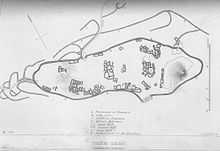Edward Barnwell
| Rev. Edward Lowry Barnwell | |
|---|---|
|
Rev. Edward Lowry Barnwell (archaeologist and schoolmaster) 1823-1887 | |
| Born | 17 November 1823 |
| Died |
9 August 1887 Melksham, Wiltshire |
| Nationality | British |
| Fields |
Archaeology Medieval architecture and History of Wales |
| Institutions | Headmaster Ruthin School |
| Alma mater | Bath Grammar School and Dr Charles Burney’s Academy. Balliol College, and Jesus College, Oxford |
Edward Lowry Barnwell (1813 – 9 August 1887) was a British antiquarian and schoolmaster who was headmaster of Ruthin School, Denbighshire for 26 years [1]
Life
Edward Barnwell was the third son of Charles Frederick Barnwell, a former Fellow of Cauis College, Cambridge. His father was descended from the Barnwells of Mileham, Norfolk.[2] His mother was the daughter of Rev. John Lowry, Rector of Clogheny in County Tyrone and had connections with the Irish aristocracy and the Perrot family of Herefordshire. He was educated at Bath Grammar School and then in a school at Greenwich which had been established by Dr Charles Burney. He went up to Balliol College Oxford and gained a first class degree in Mathematics.

In 1836 he was awarded a Scholarship at Jesus College, Oxford and was ordained by the Bishop of Oxford, before becoming a curate at Malvern. He was appointed headmaster of Dean Goodman’s Ruthin School in 1839.[3] In 1846 Barnwell married Matilda, daughter of the Rev C J Chapman, of St Peter Mancroft Norwich. Barnwell was headmaster of Ruthin School for 26 years and retired in 1865. In 1866 he purchased Melksham House in Melksham, Wiltshire. There, he financed a new church, St Andrew’s, Forest and contributed towards the cost of a new rectory and parish school.[4]
Cambrian Archaeological Association


Barnwell was a founding member of the Cambrian Archaeological Association at the Aberystwyth meeting in 1847. He served as the joint general secretary from 1855 to 1875, and as Treasurer from 1875 t0 1884. In that year he was made a Vice President of the Society in recognition of his long service.[5] Between 1855 and 1884 he contributed 102 articles and notes on a wide range of subjects to Archaeologia Cambrensis. His main interests were Archaeology, Vernacular Architecture, Medieval History and Genealogy. He had a particular interest in Prehistory and can be seen as a founding figure in the study of Welsh Prehistory. His last article in Archaeologia Cambrensis “On Some South Wales Cromlechs” disputed some of the assertions in Ferguson’s recently published “Rude Stone Monuments of all Countries” and provides an overview of Chambered Tombs in Wales. He collected artefacts[6] and he was an expert on Bronze Age metalwork, publishing a number of hoards including that from Guilsfield in Montgomeryshire. He also published general survey of the early finds Montgomeryshire which was included in the Proceedings of the Powysland Club.[7] His survey of the late Iron Age site at Tre’r Ceiri, near Nefyn in Caernarfonshire, provides useful information about the state of the site at that time.
Important Articles
Published in Archaeologia Cambrensis
- 1855 Remarks on an Iron Celt found on the Berwyn Mountains, Merionethshire vol 1 pg 150.
- 1856 Records of the Lordship of Dyffryn Clwyd and Ruthin Castle
- 1859 Roman Roads in Denbighshire
- 1864 Bronze Implements
- 1867 Domestic Architecture of South Wales, vol13, pps193, 163.
- 1869 Cromlechs in North Wales Vol15, 118-
- 1871 Tre’r Ceiri 5th Ser Vol 1, 66
- 1872 Some details of the Broadwood Find
- 1874 French Megalithic Remains
- 1875 The Rhosnesney Bronze Implements
- 1875 The Pembrokeshire Cliff Castles
- 1875 The Caergwrle Cup
- 1877 Pembrokeshire Houses
- 1884 On some South Wales Cromlechs.
References
- ↑ I O Westwood. “Biographical Notice: Edward Lowry Barnwell”, Archaeologia Cambrensis, 5th Ser, Vol !, 1884 69-74
- ↑ For the Barnwells of Mileham see Bloomfield’s “History of Norfolk”, Burke’s “Landed Gentry” and G A Carthew “History of the Hundred of Launditch”.
- ↑ In succession to Charles Williams, who became become Principal of Jesus College, Oxford in 1857
- ↑ ’“Westwood”, 69-74
- ↑ Anon: “Obituary: Rev E.L. Barnwell, M.A. F.S.A. (Scot)” Archaelogia Cambrensis 1887, 5th Ser Vol4, 317-9
- ↑ Some of these found their way into Dr Blackmore’s Museum in Salisbury-now part of Salisbury Museum
- ↑ vol 3, 1870
External links
| Wikimedia Commons has media related to Edward Barnwell. |
